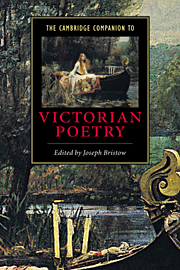Book contents
- Frontmatter
- 1 Reforming Victorian poetry: poetics after 1832
- 2 “The Lady of Shalott” and the critical fortunes of Victorian Poetry
- 3 Experimental form in Victorian poetry
- 4 The dramatic monologue
- 5 Victorian meters
- 6 Victorian poetry and historicism
- 7 Victorian poetry and science
- 8 Victorian poetry and religious diversity
- 9 The Victorian poetess
- 10 The poetry of Victorian masculinities
- 11 Aesthetic and Decadent poetry
- 12 Victorian poetry and patriotism
- 13 Voices of authority, voices of subversion: poetry in the late nineteenth century
- Glossary
- Guide to Further Reading
- Index
1 - Reforming Victorian poetry: poetics after 1832
Published online by Cambridge University Press: 28 May 2006
- Frontmatter
- 1 Reforming Victorian poetry: poetics after 1832
- 2 “The Lady of Shalott” and the critical fortunes of Victorian Poetry
- 3 Experimental form in Victorian poetry
- 4 The dramatic monologue
- 5 Victorian meters
- 6 Victorian poetry and historicism
- 7 Victorian poetry and science
- 8 Victorian poetry and religious diversity
- 9 The Victorian poetess
- 10 The poetry of Victorian masculinities
- 11 Aesthetic and Decadent poetry
- 12 Victorian poetry and patriotism
- 13 Voices of authority, voices of subversion: poetry in the late nineteenth century
- Glossary
- Guide to Further Reading
- Index
Summary
Historians of nineteenth-century British writing sometimes claim that the Victorian period properly begins some five years before Her Majesty the Queen ascended the throne. There are good reasons to justify why 1832, rather than 1837, should open the Victorian age. To be sure, the obligation within the discipline of English literature to compartmentalize historical periods often imposes barriers that can obscure important continuities between what precedes and follows a supposedly defining moment. Delimiting fields of study according to hard-and-fast distinctions looks all the more incoherent when we consider that some epochs such as the Romantic characterize a dynamic intellectual movement, while others like the Victorian remain subject to the presiding authority of a monarch. But whatever disputes we may have with the peculiar manner in which we find ourselves dividing one period from the next, 1832 designates a decisive turn of events.
The year 1832 witnessed the passing of the Great Reform Bill. This parliamentary act acknowledged a massive transformation that the nation had been undergoing for almost two decades - one whose repercussions would resonate long after Her Majesty expired in 1901. Once the Battle of Waterloo terminated the Napoleonic Wars in 1815, Tory-governed Britain moved into a phase of political unrest. In this respect, the most famous conflict occurred at St Peter's Fields, Manchester, in 1819 when some 80,000 people demonstrated for annual parliaments, universal suffrage, and the lifting of the Corn Laws (which made bread, the staple diet of the poor, costly).
- Type
- Chapter
- Information
- The Cambridge Companion to Victorian Poetry , pp. 1 - 24Publisher: Cambridge University PressPrint publication year: 2000
- 1
- Cited by



